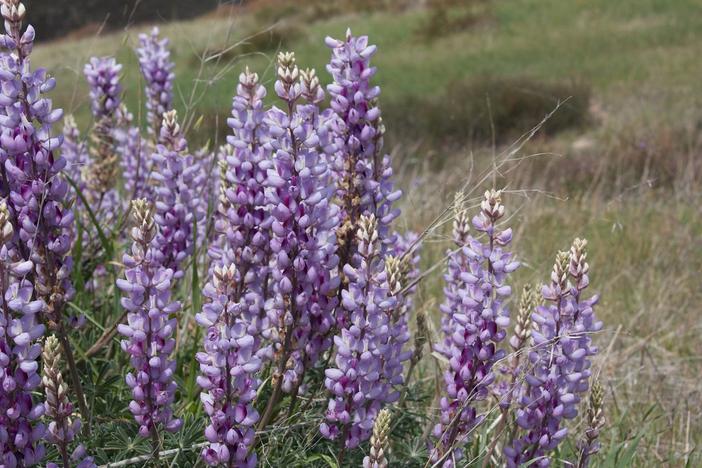Silver Lupine
(Lupinus albifrons)
Silver Lupine (Lupinus albifrons)
/
/

Laura Camp
CC BY-SA 2.0
Image By:
Laura Camp
Recorded By:
Copyright:
CC BY-SA 2.0
Copyright Notice:
Photo by: Laura Camp | License Type: CC BY-SA 2.0 | License URL: https://creativecommons.org/licenses/by-sa/2.0/ | Uploader: campsjc | Publisher: Flickr












































































Estimated Native Range
Summary
Lupinus albifrons, commonly known as Silver Lupine, is an evergreen shrub native to the coastal and inland mountain ranges of California, as well as parts of Oregon and Baja California in Mexico. It is adapted to a Mediterranean climate, thriving in chaparral, coastal sage scrub, and open woodlands. Silver Lupine typically reaches a height of 5 feet (1.5 meters) with a spread of about 2 feet (0.61 meters). Its appearance is characterized by its striking silvery foliage, which is finely divided and covered in dense, silvery hairs, giving it a feathery texture. From late spring to early summer, it produces showy spikes of light blue to violet flowers, each spike measuring 3–12 inches (7.6–30.5 cm) in length.
Silver Lupine is valued for its drought tolerance and ability to thrive in poor, rocky soils, making it an excellent choice for xeriscaping and native plant gardens. Its flowers are not only ornamental but also attract pollinators such as bees and butterflies. It is often used in restoration projects to stabilize soils and support wildlife. While it prefers full sun, it can tolerate some light shade. Once established, it requires minimal water and benefits from well-draining soil. However, it can be susceptible to root rot if overwatered or planted in poorly draining soils.CC BY-SA 4.0
Silver Lupine is valued for its drought tolerance and ability to thrive in poor, rocky soils, making it an excellent choice for xeriscaping and native plant gardens. Its flowers are not only ornamental but also attract pollinators such as bees and butterflies. It is often used in restoration projects to stabilize soils and support wildlife. While it prefers full sun, it can tolerate some light shade. Once established, it requires minimal water and benefits from well-draining soil. However, it can be susceptible to root rot if overwatered or planted in poorly draining soils.CC BY-SA 4.0
Plant Description
- Plant Type: Shrub
- Height: 4-5 feet
- Width: 3-4 feet
- Growth Rate: Rapid
- Flower Color: Blue, Pink, Purple
- Flowering Season: Spring, Summer
- Leaf Retention: Evergreen
Growth Requirements
- Sun: Full Sun
- Water: Low
- Drainage: Fast
Common Uses
Bank Stabilization, Bee Garden, Bird Garden, Butterfly Garden, Deer Resistant, Drought Tolerant, Fire Resistant, Fragrant, Hummingbird Garden, Low Maintenance, Potted Plant, Rabbit Resistant, Rock Garden, Salt Tolerant, Showy Flowers
Natural Habitat
Native to the coastal and inland mountain ranges of California, parts of Oregon, and Baja California, thriving in chaparral, coastal sage scrub, and open woodlands
Other Names
Common Names: White-Leaf Bush Lupine , Evergreen Lupine
Scientific Names: Lupinus albifrons
GBIF Accepted Name: Lupinus albifrons Benth.